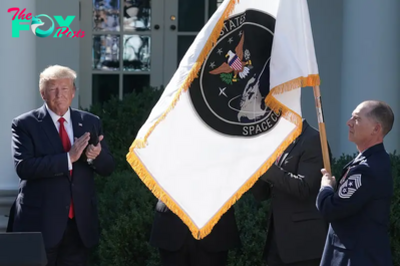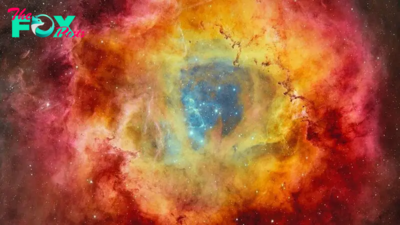Science
There may be a 'dark mirror' universe within ours where atoms failed to form, new study suggests
What if the world of dark matter was a mirror of our own, just with a broken set of rules? That might explain why dark matter appears to be so abundant yet invisible, a new theory suggests.
Dark matter is the mysterious, unknown substance that seems to make up the bulk of all the mass in the universe; for every 2 pounds (1 kilogram) of regular matter, there's roughly 10 pounds (5 kg) of dark matter. It doesn't interact with light or normal matter. The only way scientists can detect it is through its subtle gravitational influence on normal matter, such as the motions of stars within galaxies and the growth of super-large structures in cosmic time.
It might be easy to think that because matter and dark matter operate with different rules, one would be totally dominant over the other. But despite having wildly different properties, the amounts of normal matter and dark matter are still in the same ballpark. That seems like a strange coincidence. To explain this, scientists proposed there could be some sort of hidden link between them. They published their research Jan. 22 on the preprint journal arXiv.
The researchers posited that for every physical interaction in normal matter, there's a mirror of it in the world of dark matter. This would be a new kind of symmetry in nature, connecting the normal and dark matter worlds, the researchers said.
This symmetry would help explain why dark matter and regular matter have roughly the same abundances.
Related: Our universe is merging with 'baby universes', causing it to expand, new theoretical study suggests
In the paper, the researchers point out another strange coincidence. In the physics of normal matter, a neutron and proton have almost exactly the same mass, which enables them to bind together and form stable atoms. If a proton was just a little bit heavier, it would be totally unstable and decay in only a few minutes, making the formation of atoms impossible. In this imaginary scenario, the universe would be left with a sea of free-floating neutrons.
Perhaps, the researchers suggest, this imaginary, broken cosmos may be a reality in the dark matter mirror version of our universe. A special combination of physics led to a proton having roughly the same mass as a neutron; perhaps in the dark matter mirror, that combination of physics played out differently, causing the "dark proton" to evaporate and leave behind a sea of "dark neutrons" — what we identify as dark matter.
While this proposed mirror model allows for the possibility of rich interactions among dark matter particles — dark atoms, dark chemistry and a dark periodic table of dark elements — there can't be too much interaction, the researchers noted. If the dark matter interacts with itself a lot, it would tend to clump up far more than scientists think it does. So most of the dark matter has to be relatively simple — a sea of free-floating, neutral particles.
—Dark matter could be gently wobbling space-time around us — and scientists may finally know how to detect it
—Stunning 'Einstein engagement ring' from the early universe is one of the oldest ever discovered
—'We do not understand how it can exist': Astronomers baffled by 'almost invisible' dwarf galaxy that upends a dark matter theory
These additional interactions, which would be a dark mirror of our chemical world, may enable future scientists to test this theory. In the early universe, normal matter underwent nucleosynthesis, when the first elements formed in a nuclear plasma. If this new idea is correct, then there was a mirror nucleosynthesis also happening in dark matter. In those chaotic early days, channels may have opened up between the two worlds, enabling them to affect each other.
By carefully measuring the rate of element formation — something that the next generation of cosmological observatories hope to do — scientists may be able to find evidence for one of these channels and get a glimpse into the mirror dark universe.
-

 Science4d ago
Science4d agoInside Capitol Hill’s Latest UFO Hearings
-

 Science4d ago
Science4d agoYou Won’t Want to Miss the Leonid Meteor Shower. Here’s How and When You Can See It
-

 Science5d ago
Science5d agoHere’s What Trump’s Win Means for NASA
-

 Science1w ago
Science1w agoWhy Risky Wildfire Zones Have Been Increasing Around the World
-

 Science1w ago
Science1w agoIt’s Time to Redefine What a Megafire Is in the Climate Change Era
-

 Science1w ago
Science1w ago4 Astronauts Return to Earth After Being Delayed by Boeing’s Capsule Trouble and Hurricane Milton
-

 Science1w ago
Science1w agoThe Elegance and Awkwardness of NASA’s New Moon Suit, Designed by Axiom and Prada
-

 Science2w ago
Science2w agoSpaceX Launches Its Mega Starship Rocket. This Time, Mechanical Arms Catch It at Landing



























